#Pennsylvania National Guard.
Explore tagged Tumblr posts
Text
pll rewatch 1x07-1x08
while watching previous episodes, I was thinking, wait, Emily has to have a car this season because of [SPOILER]. Does she just randomly start appearing with one?
of course not. instead she wins a car (the BEAUTIFUL TOYOTA) in a raffle the same night she falls down in a mirror maze
1x07 begins with us still on Homecoming night, where we get (1) Spencer, Hanna, and Aria clinging to each other like frightened puppies while looking for Emily and (2) Toby bringing Emily to the hospital
Spencer suggests the trio split up and is immediately indignant at the idea she be the one to go alone lmao
Poor Toby. No one is nice to him :( Spencer said her classic "The devil has a name and it's Toby!" line but Pam also said "people cross the street when they see him", poor fricking teenager.
Emily is like, as someone who has exchanged more than one sentence with Toby, I don't think he's a murderer? and Spencer cannot stand it she is so annoyed
Emily phrases it as "why am in my bed and not in a body bag" <3 Emily's horror movie visceral imagination
FIRST BARRY MAPLE APPEARANCE. HE'S HERE. THE ONE KIND-OF OKAY COP IN ROSEWOOD. ALL HAIL BARRY MAPLE.
Hanna is back to winning her one-woman #BestAlly competition and she's doing so good! I'll repeat this in the tags of a future post, but it is so interesting to me that this is the first step in Hannily becoming close as a pair - before Hanna gets the photos, Aria and Spencer are the ones expressing individual concern over Emily, but once this arc happens, Hanna is all-in
And says exactly what Emily needs to hear. Also saying things to injured Emily: Pam Fields, who is stressing her daughter out and has no idea why.
Ella, Byron is a cheating douchenozzle but go to your son's sportsball game! Mike's done nothing wrong!
Spencer has zero concept of having a job, let alone a service one. Of course she can waltz right into the kitchen to chit-chat, of course Alex must be lying if he says he's working on a day the club is closed. Oh, Spencer.
She does take to making fruit kebabs to hang out with him
Alex says he's never seen her photo with devil horns before and I don't think he's lying...so an A thing? But I prefer to think that it was the kitchen employee from the day before who was all het up about Spencer's health code violations
can any of the liars look normal when talking to the blind girl. (Spencer about Jenna to Emily: You didn't eat one of her cookies, did you?)
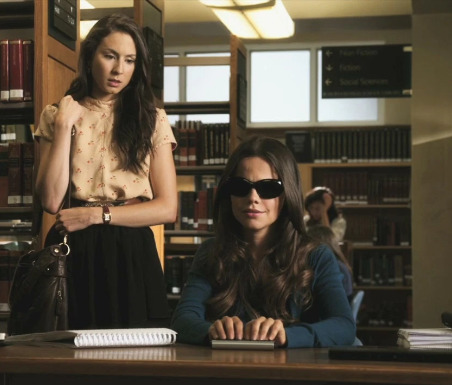
well, Emily did okay, but Emily had to deal with Jenna straight up sitting on her bed. Who does that?? But very funny in light of the S2 Halloween episode, isn't Emily dealing with enough.
Aria playing peacemaker as Spencer and Hanna argue in the woods. Oh, Aria, it's like watching a terrier trying to get in between a bloodhound and a golden retriever.
and here we get our first inter-liar callout of Spencer's parents being there to bail her out! I completely forgot it was Hanna who does this, but very fair, Hanna, very fair
Lucas and Hanna bond over watching the stupidest youtube videos, which makes so much sense for them. SMH Sean, not even a smile for turkey on a skateboard? Between that and sending Aria flowers, you deserve the shenanigans you accidentally find yourself in later this season
Emily and Maya get to have nice cute banters about going on a date and manage to make out at a zombie movie without anything bad happening! Good for them!
Especially since everything non-Maya makes Emily look so distressed
like Toby, which leads to the best conversation Emily, Spencer, and Hanna have on Emily's window seat
Emily, clearly upset: I couldn't bring myself to ask. Jenna was so upset. But his bike… it looked like it was… like it was wrecked.
Spencer: Well, I'm not gonna cry over this, and neither should you.
Hanna: Spencer, if she liked him she can cry about it!
Spencer: Well, I'm sorry for speaking.
Spencer: ......Look she's right, I can't tell you what to feel.
and yet Spencer will never stop attempting to, love this maniac
good god I forgot about the Jason recasting, I look forward to when this dark-haired suit-wearer with a stick up his ass is gone
Best A message:
SUBJECT: THE DEDICATION
DO IT RIGHT. I'LL BE WATCHING. JUST LIKE TOM SAWYER. --A
Why did A prepend the message with a subject, do they miss emailing Spencer? I had to explain the Tom Sawyer reference too haha.
A's gonna trick them into painting a fence next
We get so many flashbacks of Alison being terrible by the lakeshore that summer day
Flashback dynamic notes: Emily smiles and laughs at everything Alison says, no matter how mean; Aria is horny for Noel and pays the least attention to Alison; Hanna laughs at the first insult Ali throws at Lucas but then very weakly tries to defend him; Spencer is...Spencer is almost getting bored of Alison's terribleness?
and yet "that's immortality my darling" remains, and so does Alison's bracelet in her nightstand drawer
I like to think Aria had to dig through all her shit to find her bracelet, compared to the other three XD
"what about justice" re: never finding out who killed Alison, Spencer my sweet summer child....sometimes Spencer is the most naive of the liars, in her own way
Spencer's already sent two S.O.S texts this season. Did the girls agree on this code or did Spencer just decide this is her way of asking for help and everyone automatically understood it
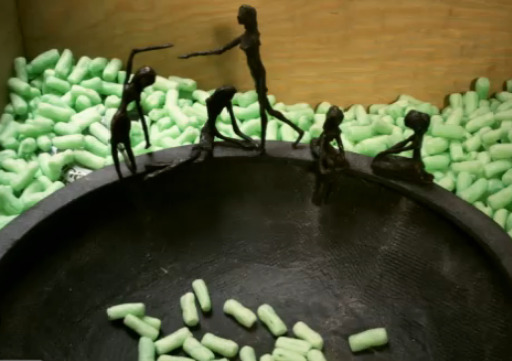
isn't this memorial a bit too revealing of her dynamic with y'all, I'd be so self-conscious
and yet, even after an episode filled with flashbacks of Alison's cruelty, I understand all four of their speeches for her.
#as much as i love how much more removed Aria's speech is in being about the concept of memorials themselves#the thing with 22 episodes is that they can really slow burn each girl's feelings about Alison in a way that feels real#pll watching#pll#mine#wayne fields is in the pennsylvania national guard#which is completely compatible with an afghanistan deployment but is going to make zero sense with everything else they do with him
6 notes
·
View notes
Text

Revolutionary War Pension Files Seals ✒️🪙📜
Official American 19th century records have fascinating visual features and many remarkable examples of those can be found in the Revolutionary War pension files at the National Archives.
During the conservation stabilization treatment of these records, the conservators come across watermarks, ribbons, wood engraving illustrations, historical repairs, and of course various seals and wafers.
Guest Post by
Paper Conservator (Document Conservation Laboratory, RXC)
Ewa Paul (National Archives)
The term “seal” can be confusing because it refers to both the impression and the device which produces it. Early documents or letters were secured with resinous sealing wax impressed with a stamp seal and were reserved for officials or aristocrats. Later on, in the 19th c., the majority of the literate people used circular paste wafers and paper wafer seals which were much cheaper and easier to use. Wafers are “thin, flat, baked adhesive discs” made of flour paste. They would be moistened on both sides before being pressed to seal a letter or a document. Wafers came in different sizes and colors, and were used as adhesive joints or for affixing paper seals on official documents as shown below.
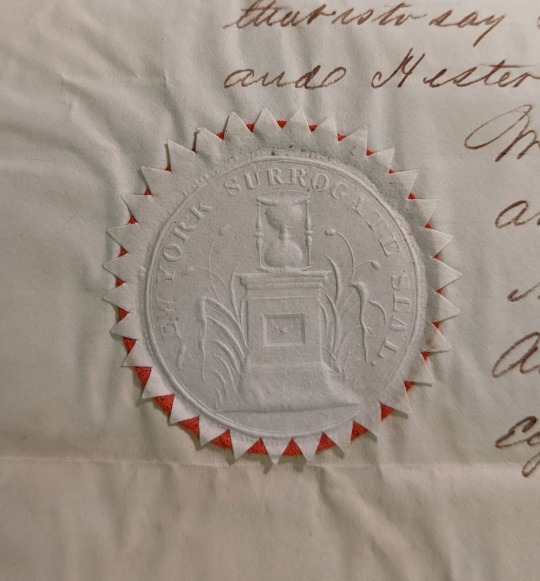
The wafer made from red colored paste is underneath the paper seal stuck on top. It is the same seal shown on white and blue wafer paper seal.
Sometimes the wafer paper seals would be made to purposefully emulate the appearance of the older wax / resinous seals as illustrated below (NARA records).
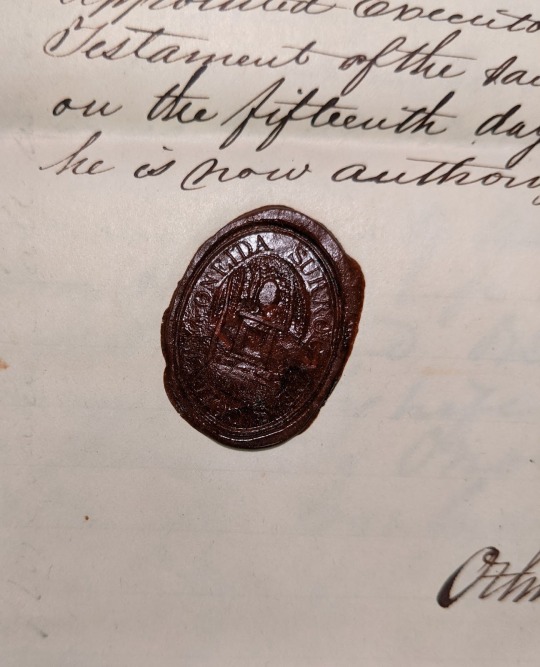
The paper seals found on the Revolutionary War documents vary in color, style and type and can have eye-catching, intricately carved designs.
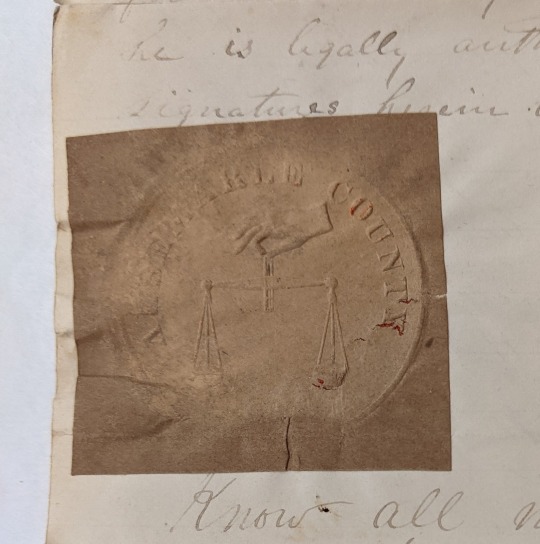
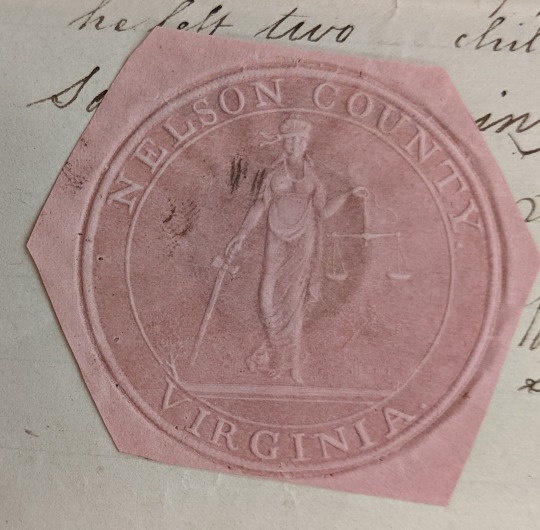
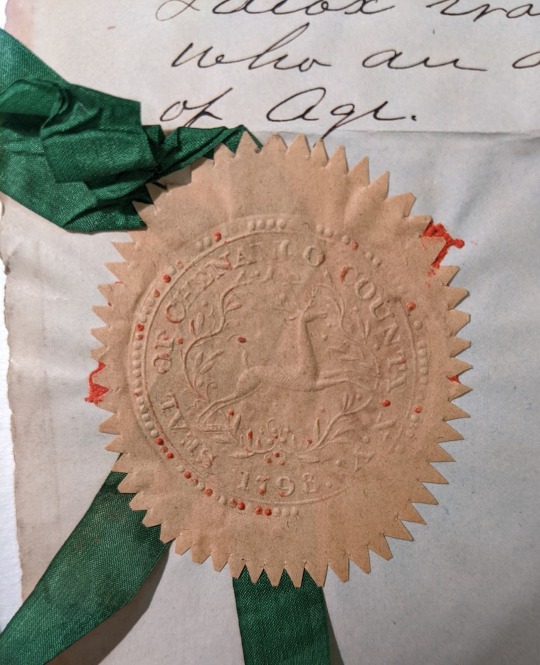
The Revolutionary War pensions records bear many types of seals: hand-written seals, ink printed seals, embossed paper wafer seals and “Scherenschnitte” hand-cut seals.
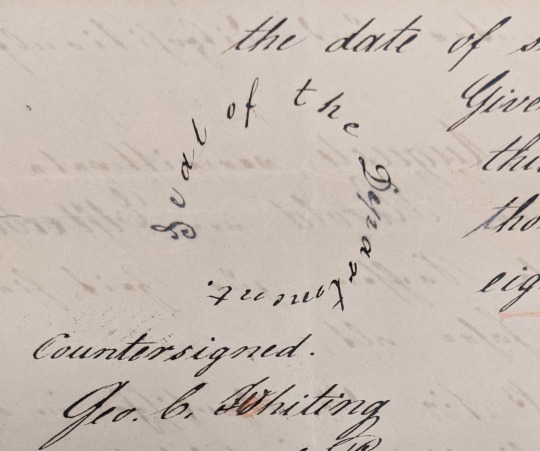
The image of the beehive in the inked seal above illustrates the importance of agriculture, as does the plough in the paper seal below, featured in the Revolutionary War pension file of James Scott, TN.


Hand-cut Scherenschnitte seals found on the American Revolutionary War pension records. Scherenschnitte paper seals are one of a kind. Scherenschnitte means “scissor cuts” and is a traditional folk-art brought to Pennsylvania in the 18th century by German immigrants.
As other methods of document protection became common, particularly the self-sealing envelope, the use of wafer paper seals declined and by the end of the 19th century the wafers and seals became obsolete.
These days the seals remind us about the importance of privacy and the need to guard our information, and how tricky it must have been to keep things private in the days past.
356 notes
·
View notes
Note
Can I ask why the Pinkerton agents get such a bad rap online? All I know from them comes from the Sherlock Holmes novel The Valley of Fear, where they help take down a gang of extorsionist coal miners.
So the Valley of Fear concerns a real-life incident that helped to shape the Pinkertons' reputation: their destruction of the Molly Maguires in the coalfields of Pennsylvania. An early trade union of miners of mostly Irish extraction, the leadership of the Molly Maguires were accused of murder, arson, kidnapping, and a whole host of other crimes by undercover Pinkerton agents who had infiltrated their ranks on behalf of the Philadelphia and Reading Railroad, who the Molly Maguires were fighting over wages, hours, and working conditions. Dozens were sent to jail for long stretches of time, and ten men were ultimately hanged as a result of Pinkerton testimony.

The fact that the evidence against the Maguires largely stemmed from undercover informants paid by management to disrupt and destroy their organization and other suspect sources of evidence like jaihouse snitches, and that the prosecutions against the Maguires were personally carried out by the CEO of the Philadelphia and Reading Railroad in the midst of labor conflict over who ran the coalfields, has led a lot of labor historians to conclude that the Molly Maguires were stitched up in the courts and that the Pinkertons committed wholesale perjury, acted as agents provocateur to provoke the crimes they then testified to, and caused the judicial murder of ten men.
That was just the start of their long and inglorious history of being the favorite goons of anti-union robber barons: the gun thugs who were outfought at Homestead were Pinkertons, as were the private armies who fought for capital during the Great Railroad Strike of 1877 who had to be once again bailed out by the National Guard. Likewise, their foray into bearing false witness continued with the manufactured confession that named UMW leader Big Bill Haywood as the man who arranged for the assassination of Governor Frank Steunenberg of Idaho.
So yeah, the Pinkertons have earned every last drop of their evil reputation. There is blood on their hands.
994 notes
·
View notes
Text
Kamala Harris herself has now borrowed Walz’s lingo and is also calling her opponents “weird”, while Walz is all over our television screens, bolstering the vice-president’s candidacy and playing “attack dog” against the Trump/Vance Republican ticket. I’ll be honest: last month, I would have struggled to pick Walz out of a lineup. This month? I’m Walz-pilled. I have watched dozens of his interviews and clips. And I’m far from alone. He has an army of new fans across the liberal-left: from former Bernie Sanders 2020 campaign co-chair Nina Turner, to one-time Democratic congressman Beto O’Rourke, to gun-control activist David Hogg. “In less than 6 days, I went from not knowing who Tim Walz is,” joked writer Travis Helwig on X, “to deep down believing that if he doesn’t get the VP nod I will storm the capitol.” According to Bloomberg, the Harris campaign has narrowed down its “top tier” of potential running mates to three “white guy” candidates: Walz (hurrah!), plus the Arizona senator Mark Kelly and Pennsylvania governor Josh Shapiro. Both Kelly and Shapiro have their strengths – and both represent must-win states for the Dems. Allow me, however, to make the clear case for Walz. First, there’s his personality. The 60-year-old governor would bring energy, humor and some much-needed bite to the Democratic presidential ticket. There’s a reason why his videos have been going viral in recent days. Tim Kaine he ain’t. Pick the charismatic and eloquent Walz and you have America’s Fun Uncle ready to go. Then, there’s his résumé. A popular midwest governor from a rural town. A 24-year veteran of the army national guard. A high school teacher who coached the football team to its first state championship. It’s almost too perfect! Finally, there’s his governing record. You will struggle to find a Democratic governor who has achieved more than Walz in the space of a single legislative session. Not Shapiro. Not JB Pritzker of Illinois. Not even Gretchen Whitmer of Michigan. [...] Think about it. Democrats can have Tim Walz on the ticket, who called the anti-war, pro-Palestinian ‘uncommitted’ movement “civically engaged” and praised them for “asking for a change in course” and “for more pressure to be put on” the White House, or they can have Josh Shapiro, who called for a crackdown on anti-war, pro-Palestinian college protesters and even compared them to the KKK. They can have Walz on the ticket, who has reportedly “emerged among labor unions as a popular pick” after signing “into law a series of measures viewed as pro-worker” including banning non-compete agreements and expanding protections for Amazon warehouse workers, or they can have Mark Kelly, who opposed the pro-labor Pro Act in the Senate (but has since touted support for it). They can have Walz, who guaranteed students in Minnesota not just free breakfasts but free lunches, or Shapiro, who has courted controversy in Pennsylvania with his support for school vouchers. They can have Walz, who calls his Republican opponents “weird” and extreme, or Kelly, who calls his Republican opponents “good people” who are “working really hard”. This isn’t rocket science. Walz is the obvious choice. Not only is he the ideal “white guy” running mate for Harris, against both Trump and Vance, but he is already doing the job on television and online, lambasting Vance in particular over IVF treatment and insisting he mind his “own damn business”.
Zeteo News founder Mehdi Hasan for The Guardian on why picking Tim Walz as Kamala Harris's running mate is the best option (07.29.2024).
Zeteo News founder Mehdi Hasan wrote in The Guardian why Tim Walz should be Kamala Harris’s running mate. Hasan’s opinion piece is worth reading.
#Mehdi Hasan#Zeteo News#The Guardian#Opinion#Kamala Harris#Tim Walz#2024 Presidential Election#2024 Veepstakes
154 notes
·
View notes
Text
Tom Corbett

Physique: Average Build Height: 5′ 9″
Thomas Wingett Corbett Jr. (born June 17, 1949) is an American politician, lobbyist, and former prosecutor who served as the 46th governor of Pennsylvania from 2011 to 2015. A member of the Republican Party, he was also attorney general of Pennsylvania.




Handsome, nice build and a perfect crown of white hair. Hell… if I was casting a movie, he'd be my ideal governor. Or pornstar. Plus, from what I can tell. Corbett has a nice thick ass on him.




Born in Philadelphia, Corbett graduated from Lebanon Valley College and St. Mary's University School of Law and served as a captain in the Pennsylvania Army National Guard. He began his career as an assistant district attorney in Allegheny County, PA, in 1976. Corbett then joined the U.S. Department of Justice as an assistant U.S. Attorney for the Western District of Pennsylvania, serving from 1980 to 1983, upon entering private practice.


As usual, he's straight with a wife, grown kids and grandkids. After a legal career that included stints as an assistant district attorney, U.S. attorney and Pennsylvania attorney general, Corbett now days, is back in the classroom teaching law and is also registered lobbyist. I wonder if I should go to Pennsylvania and study law. For now, I'll just fantasize about Corbett and how good his ass would feel like.

110 notes
·
View notes
Text
A Minnesotan Sizes Up Tim Walz
During his tenure, student achievement has slipped, crime has surged, and state residents have fled.
By Scott W. Johnson - Wall Street Journal
St. Paul, Minn.
Tim Walz has such a bad record as Minnesota’s governor that I was astonished when he landed on Vice President Kamala Harris’s vice-presidential shortlist. As Minnesota’s Center of the American Experiment has documented, under Mr. Walz Minnesota has become a high-crime state. Student achievement has tumbled as spending on schools has skyrocketed. Per capita gross domestic product has fallen below the national average. Minnesotans have joined residents of New York, California and Illinois in fleeing their home state.
Pennsylvania Gov. Josh Shapiro—also on Ms. Harris’s shortlist—made sense to me. Pennsylvania is a key state. Mr. Shapiro seems to be a man of substance and would give liberal Jews a reason to vote for Ms. Harris without a guilty conscience. As a Jewish supporter of Israel, I worried that Mr. Shapiro would give the animus throbbing in the heart of the Democratic Party cover. Indeed, that animus drove a nasty intraparty campaign against him.
But Tim Walz? I’m a conservative Republican. I don’t completely understand Democrats’ ways. As an observer of Minnesota politics, however, I understand how Mr. Walz became governor. Having served six terms in Congress from a rural district, he challenged the endorsed DFL (Democratic-Farmer-Labor Party) candidate—a liberal metro-area state senator, Erin Murphy—in the 2018 DFL primary. Ms. Murphy was also challenged by another metro-area liberal, Lori Swanson, then state attorney general. With Ms. Murphy and Ms. Swanson dividing the liberal urban vote, Mr. Walz and his far-left running mate, former state Rep. Peggy Flanagan, won the primary with 41%.
On taking office in 2019, Gov. Walz was restrained by a one-seat Republican majority in the state Senate—until Covid hit in the spring of 2020. He declared a state of emergency on March 25, 2020, and ruled by decree for 15 months. He proclaimed the emergency on the basis of an allegedly sophisticated Minnesota Model projection of the virus’s course in the state. In fact, the projection reflected a weekend’s work by graduate students at the University of Minnesota School of Public Health. Relying on their research, Mr. Walz presented a scenario in which an estimated 74,000 Minnesotans would perish from the virus. The following week the Star Tribune reported that with the lockdown Mr. Walz ordered, 50,000 would die. Maybe it would have been preferable to address the virus through democratic means.
Having destroyed jobs and impeded life routines, including family get-togethers and church attendance, Mr. Walz finally let his one-man rule lapse on July 1, 2021. When the Johns Hopkins Coronavirus Resource Center stopped counting in March 2023, the deaths of 14,870 Minnesotans were attributed to the virus. (In 2020 I successfully sued the administration for excluding me from Health Department press briefings on Covid.)
During the state of emergency, protests broke out in Minneapolis on Memorial Day 2020 following the death of George Floyd. That Thursday, rioters burned Minneapolis’s Third Precinct police station to the ground. Mr. Walz didn’t deploy the National Guard until the weekend. Riots, arson and looting throughout the Twin Cities caused about $500 million in damage.
Minnesota leads the nation in Covid fraud. Under the auspices of the Feeding Our Future nonprofit, its founder, Aimee Bock, allegedly recruited mostly young Somali men to seek reimbursement for millions of meals supposedly served to poor students and families. According to indictments handed up by a grand jury to U.S. Attorney Andrew Luger, Ms. Bock and others allegedly defrauded the state and federal government of $250 million. Ms. Bock has pleaded not guilty to the fraud charges.
Among the 70 defendants charged to date, 18 have pleaded guilty. In April the first of the cases to go to trial had seven defendants; five were convicted. The remaining cases have yet to be tried. In all, the Minnesota Department of Education oversaw the payout of $250 million to reimburse fictitious meals. The nature and scale of the fraud are staggering. Mr. Walz tried to blame state district court judge John Guthmann, who in April 2021 handled a case regarding the department’s processing of applications for reimbursements. According to Mr. Walz, Judge Guthmann ordered the state to continue payouts to the alleged perpetrators of the fraud even after the state Education Department discovered it.
In September 2022, Judge Guthmann authorized a news release titled “Correcting media reports and statements by Gov. Tim Walz concerning orders issued by the court.” The release concluded: “As the public court record and Judge Guthmann’s orders make plain, Judge Guthmann never issued an order requiring the MN Department of Education to resume food reimbursement payments to FOF. The Department of Education voluntarily resumed payments and informed the court that FOF resolved the ‘serious deficiencies’ that prompted it to suspend payments temporarily. All of the MN Department of Education food reimbursement payments to FOF were made voluntarily, without any court order.”
In November 2022 Mr. Walz was elected to a second term, and the DFL won majorities in both chambers of the Legislature. In the preceding two years the state had accumulated an $18 billion budget surplus. With the DFL in full control, Mr. Walz and the Legislature have spent the $18 billion surplus on infrastructure, education and other programs that will burden the state for years. They have also raised taxes.
Mr. Walz and his DFL colleagues have backed measures establishing Minnesota as a mecca for abortion and a “trans refuge.” The legislation prohibits enforcing out-of-state subpoenas, arrest warrants and extradition requests for people from other states who seek treatment that is legal in Minnesota. It also bars complying with court orders issued in other states to remove children from their parents’ custody for authorizing hormone treatment or surgery to alter sex characteristics.
Like so many Democrats who have kept up with the demands of the progressive agenda, Mr. Walz has “grown” in office. In his second term, he has been the most left-wing Minnesota governor since the socialist Floyd B. Olson (1931-36). I doubt that Mr. Walz could be elected to Congress in his old district, which is now represented by a Republican. The idea that he can appeal to voters who don’t already support Ms. Harris seems far-fetched.
Mr. Johnson is a retired Minneapolis attorney and contributor to the site Power Line.
#Tim Walz#minnesota#Democrats#kamala harris#Obama#Biden#Corrupt#trump#trump 2024#president trump#ivanka#donald trump#america#americans first#america first#repost#corruption kink#government corruption#democrats are corrupt#biden corruption#impeach#maga
77 notes
·
View notes
Text
This story is a Kite, a special category dedicated to first-person reports that rely heavily on a writer’s first-hand observations and experiences. Read more about why PJP uses this category here.
Well before Luigi Mangione became a temporary resident here at State Correctional Institution at Huntingdon, Pennsylvania, he and the crime he is alleged to have committed were topics of speculation among the prison population.
Through the prison grapevine, I learned that Mangione was being held in D-Rear, or the rear of D Block, a part of the prison where death row prisoners used to be housed.
Rather than the orange jumpsuit that is standard issue in here, he was wearing a “turtle suit,” a blue padded getup used primarily for prisoners vulnerable to committing self-harm.
Every time he was escorted from his cell, D Block got locked down. During lockdowns, all prisoner movement is prohibited.
Luigi Mangione was incarcerated at SCI Huntingdon for close to two weeks in December, before being transported to New York. Photo courtesy of the Associated Press.
Within 48 hours of Mangione’s arrival here, cable and broadcast news had set up shop outside the prison. That evening, Ashleigh Banfield, the host of NewsNation’s “Banfield” show, placed a curious kind of spotlight on this prison.
During that nighttime interview, Banfield realized the prisoners on E Block were watching her show when they shouted and blinked their ceiling lights in response to the conversation she was having from the studio with Alex Caprariello, her reporting colleague in the field. So she started posing questions directly to the prisoners, who responded both vocally out of their windows and visually with their cell lights.
I haven’t heard voices here raised in such raucous unison since 2018, when the Philadelphia Eagles won the 2017 Super Bowl. Though it was hard for Caprariello to hear anyone shouting from C Block, where I live, I suppose people relished the moment to have a voice.
The day after the NewsNation “interview” with E Block aired, the prison’s deputy superintendent threatened everyone in the unit, particularly the guys on the street-facing side, with time in the hole if they yelled from their cell or blinked their lights for the media again.
You’ll notice in subsequent NewsNation interviews outside E Block that guys were still vocal, just not so much with the lights, to avoid being traced back to a particular cell. The deputy superintendent’s threat was all the act-right motivation they needed. Freedom of speech suppressed? Check.
Mangione’s notoriety likely softened the amount of oppression the guards here would usually dispense because they wanted something from him. They wanted stories to share with coworkers and friends and family. Everyone wanted a piece of the biggest crime story in the nation.
Now, nearly 2,000 of us are part of that story. No matter what, Mangione is and will forever be an SCI Huntingdon alumnus. His brothers here will intently follow his case as it moves forward through the criminal justice system, all the while telling anyone who’ll listen, if it had been them, what they would have done to keep from getting arrested in the first place.
Disclaimer: The views in this article are those of the author. Prison Journalism Project has verified the writer’s identity and basic facts such as the names of institutions mentioned.
23 notes
·
View notes
Text
As the tweet’s author Kevin Dalton writes, Gavin Newsom announced a “tiny home” project in March of 2023, which was to be completed in a matter of “months” and not “years” — but as you also read, not a single home has actually been built. In May of this year, which was over a year past the initial announcement, we received an update:
Plans change on Newsom’s tiny home promise In March 2023, Governor Gavin Newsom told a crowd assembled at Cal Expo in Sacramento that the state would help local governments address the homelessness crisis. He announced that the California National Guard would deliver 1,200 tiny homes to four jurisdictions: Sacramento would receive 350 homes, Los Angeles would get 500, San Jose would receive 200 and San Diego County would get 150. [snip] Then … crickets. In October, the city announced it had identified a site for half of the tiny homes in Sacramento, an empty lot next to a never-occupied strip mall on Stockton Boulevard in South Sacramento.
Construction crews broke ground on the Sacramento location in March of 2024, and the homes were then projected to be completed in the fall of 2024… but today is the first day of 2025—like Dalton said, “not a single home” has been delivered. Where did all that money go? Back into the bureaucratic and political ether I’m sure.
Now, compare that to the image on the right-hand side of the tweet, which features a story about a bunch of Pennsylvania Amish who built a dozen tiny homes for those who lost everything during Hurricane Helene in a span of two days…and, for a fraction of the cost that Newsom budgeted. Here’s this, from a report out of Boone, North Carolina:
31 notes
·
View notes
Note
Hello! I've been enjoying your writing references and notes, thank you for sharing! I was wondering, do you have any for something set during the Civil War? I've been sitting on the idea of writing a short story inspired by Little Women and I want to do it some justice at least. I would be happy with whatever you can offer <3
Writing Notes: The American Civil War
A four-year war (1861–65) between the United States and 11 Southern states that seceded from the Union and formed the Confederate States of America.
The two sides fought over the enslavement of African Americans and the rights of individual states.
The economy of the South relied on enslaving Black people to work on plantations of cotton and tobacco, while in the industrialized North, public opinion was in favor of ending slavery.
The war ended in 1865 with a Union victory.
THE UNION AND THE CONFEDERACY

By February 1861, 7 southern states (South Carolina, Mississippi, Florida, Alabama, Georgia, Louisiana, and Texas) had broken away from the rest of the US.
On 4 February, they agreed to form a separate government, the Confederate States of America.
The first shots of the war were fired at Fort Sumter in South Carolina on 12 April, and within 3 months, Virginia, Arkansas, North Carolina, and Tennessee had joined the Confederates.
23 states remained in the Union, including the slave-owning “border states”.

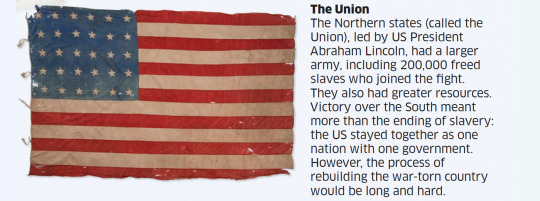
NEW TECHNOLOGY
The US Civil War was one of the first industrial wars in history, making use of modern technologies developed during the course of the 19th century. The war was fought across a wide area, so railways were critically important in carrying troops and supplies to where they were needed on the front lines. Generals were able to communicate with each other by telegraph.

Weapons. Fast-firing repeating rifles, such as the Spencer rifle, were used for the first time in the Civil War. The widely used “Napoleon” field gun could hit a target up to 1,600 m (5,250 ft) away. Also developed at this time was the Gatling gun, an early machine gun.

Ironclad battleships. Steam-powered battleships protected by iron or steel plates were known as ironclads. The first-ever battle between ironclads was fought in the Civil War in 1862, on the James River estuary in Virginia.

Modern Communications. In the Civil War, railroads moved troops around, aerial balloons spied across enemy lines, and the telegraph (above) sent and received instant information. Its receiver machine recorded messages on paper tape in Morse code, which uses dots and dashes to represent numbers and letters of the alphabet.
WAR PHOTOGRAPHY

The Civil War was one of the first conflicts to be extensively photographed. Dozens of photographers toured the battlefields, and their stark images of soldiers, dead and alive, brought shocking scenes of the war to the public around the world.

A Continental War. Most of the fighting in the war took place in Virginia, Maryland, and Pennsylvania in the east. There were also battles in Kentucky and Tennessee in the west and down the Mississippi River to New Orleans. In 1864, General William T. Sherman (above) conducted a major campaign in Georgia and the Carolinas.
TIMELINE
A nation divided. When 7 US states seceded (broke away) from the Union to form the Confederacy, President Lincoln refused to recognize the new government, and called on them to rejoin the Union. The Confederates refused, and tried to gain control of federal forts in the south. The stage was set for a bloody war that would last for the next 4 years.
12 April, 1861: Fort Sumter attacked. Confederate troops under Brigadier General Beauregard fired on Union soldiers who were guarding Fort Sumter in Charleston, South Carolina. These were the first shots to be fired in the Civil War.
17 September, 1862: Battle of Antietam. The bloodiest day of fighting in the entire war took place at the Battle of Antietam, in which nearly 23,000 soldiers were wounded or killed. The Union army suffered the most casualties, but managed to halt the advance of General Robert E. Lee’s Confederate forces into the Union state of Maryland. The next day Lee was allowed to lead his shattered army back to Virginia.
13 December, 1862: Confederate victory. Fortune swung back to the Confederate side at the Battle of Fredericksburg, in Virginia. General Burnside, newly appointed by Lincoln to command the Union army, led 120,000 troops to attack a Confederate force of 80,000 – by far the largest number of men to meet in any conflict of the Civil War. Burnside was decisively defeated – a victory that gave fresh hope to the Confederates and led to complaints that the Union’s generals were doing a bad job.
1 January, 1863: All slaves to be free. President Lincoln gave new purpose and direction to the war by issuing the Emancipation Proclamation. This was an order freeing all slaves in the Confederate states. Of course, this could not happen until the Union had won the war against the Confederates, but his words would eventually lead to the freeing of millions of African American slaves.
3 March, 1863: First African-American regiment. The first official regiment of African-American soldiers, the 54th Massachusetts Infantry Regiment, was formed to fight in the Union army.
4 July, 1863: Vicksburg captured. Union troops captured the Confederate fortress of Vicksburg, on the Mississippi River, after a 2-month siege. It was a major turning point in the war, coming a day after the Union victory at Gettysburg. The Union now controlled the length of the Mississippi River, dividing Louisiana, Texas, and Arkansas from the rest of the Confederate states, and cutting off supplies.
15 November, 1864: March to the Sea. The capture of Atlanta in Georgia by Union General William T. Sherman in September was a heavy blow to the Confederates. Although deep inside enemy territory, Sherman decided to march his army all the way from Atlanta to the coast at Savannah. He ordered his men to live off the land and destroy farms and factories on their way. This brutal “scorched earth” policy inflicted lasting damage.
9 April, 1865: Lee surrenders to Grant. The Confederate capital of Richmond, in Virginia, fell on 3 April. The Virginian Confederate army was exhausted. To avoid further losses, Confederate General Robert E. Lee surrendered to General Ulysses S. Grant at Appomattox Court House in Virginia. By May, all the Confederate armies had stopped fighting. The war was finally over.
14 April, 1865: Assassination of Lincoln. President Lincoln was shot while attending a play at Ford’s Theatre in Washington, DC. He died the next morning. A funeral train took 14 days to transport his body back for burial in his hometown of Springfield, in Illinois.

The Battle of Gettysburg. The most famous battle of the Civil War was fought over three days, from 1 to 3 July 1863, around the small town of Gettysburg in Pennsylvania. The Confederates attacked, confident they would win, but the Union army did not give way and eventually won. The battle had the heaviest casualties in the war. An estimated 51,000 soldiers were killed, wounded, or listed as missing. Four months after the battle, President Lincoln visited the site and delivered a famous speech known as the Gettysburg Address. In it, he said that the US was “dedicated to the proposition that all men are created equal”.

The Abolition of Slavery. On September 22, 1862, President Lincoln issued the Emancipation Proclamation, which freed all enslaved people in the Confederacy from January 1, 1863. In 1865 Congress passed the 13th Amendment (law change) to the US Constitution, making slavery illegal across the soon-to-be reunited country.
RECONSTRUCTION

African Americans Voting in Richmond in Virginia, 1871
The slow process of rebuilding the economy of the south, left in ruins after the war, is known as Reconstruction. Before rejoining the US, each state of the Confederacy had to agree to amendments to the US Constitution – the supreme law of the nation – that ended slavery, granted citizenship to African Americans, and gave the vote to all male citizens.
Reconstruction ended in 1877, and many southern state governments immediately reversed the new rights given to African Americans, making it hard for them to vote, go to school, or find paid work. They introduced laws that legalized discrimination against Black people that remained in place for almost a century.
Below are objects that serve as evidence of the turmoil leading up to the election and the events that happened immediately after.
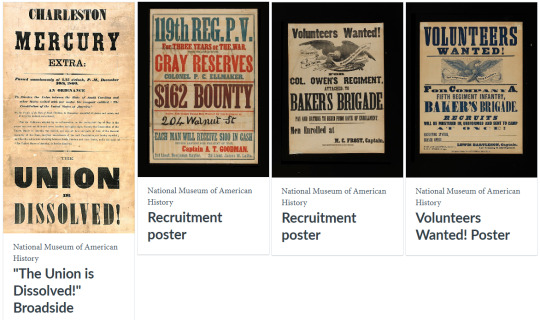

Below are objects that show how the Union and the Confederacy dealt with money problems, while also exploring what was considered money then and who produced it.


The objects below belonged to the men and boys who fought on the front lines for both Confederate and Union forces. They represent what soldiers wore, what they ate, how they coped, and what they held dear to them. These items, more often than not, were the only possessions soldiers kept while enlisted; on many are personal touches added by the owner.


Below are a few objects used as weapons by both Confederate and Union armies.

Below are a few objects used by or presented to the leaders of Union and Confederate forces.

For many Americans, both civilian and military, who lived through the conflict, the Civil War was the monumental event of their lifetime. They collected relics as they adjusted to the immediate consequences of the war. The nation grappled with the residual effects of the Civil War for more than a century. Below are objects that evoked different memories from the war.

Sources: 1 2 3 4 5 ⚜ More: Notes & References
It's nice to hear this, thanks so much! <3 Hope these notes help as quick references. Further research might be needed if you're planning to write something more detailed.
#anonymous#writing reference#history#writeblr#dark academia#spilled ink#creative writing#writing inspiration#writing notes#writing prompt#light academia#lit#literature#writing#writing resources
26 notes
·
View notes
Text
"Ten years ago this August, a white police officer killed 18-year-old Michael Brown in Ferguson, Missouri. What happened on Canfield Drive that day sparked a nationwide movement to save Black lives, end police brutality, and make safety a reality for all people. As a registered nurse, pastor, and local activist, I spent over 400 days protesting alongside thousands of my fellow community members.
I will never forget the brutality we faced in response to our calls for humanity. Police used tear gas, pepper spray, rubber bullets, noise munitions, batons, shields, fists, and boots against us. The Missouri National Guard called us “enemy forces.” Our government labeled us “Black identity extremists.” Many politicians condemned us. Those of us on the front lines were traumatized, but we knew that time would prove we were on the right side of history — and it did. Time will prove the same for the students currently protesting across the country.
....
None of what protesters in Ferguson and at Columbia University have experienced is new — it’s happened hundreds of times throughout our history. It happened in Boston in 1770, when protesters supported independence from British rule. It happened in Pennsylvania in 1897, when mine workers demanded labor rights. It happened in Virginia in 1917, when protesters demanded equal rights for women. It happened in Selma in 1965, when protesters demanded civil rights for Black people. It happened in New York, Chicago, St. Louis, and elsewhere in 1968, when protesters demanded an end to the Vietnam War. And it happened in Washington, DC, and in communities all across our country in 2020, when protesters demanded an end to police brutality.
Behind every attempt to silence a protester is an idea that those in power don’t want people to hear, yet protest movements have been remarkably successful throughout our history. The women’s suffrage movement led to the ratification of the 19th Amendment despite opposition from those in power. The same is true of the Civil Rights movement, which culminated in the Civil Rights Act of 1964 and Voting Rights Act of 1965, and the youth-led nationwide protests that led to the end of the Vietnam War, and South African apartheid.
...During the Ferguson protests, a group of Palestinians visited us and taught us how to protect ourselves against tear gas. That moment opened my eyes to the connection between state-sanctioned violence at home and abroad.
..It’s time our government responded to popular social movements with an ear, instead of a boot.
#student protests#cori bush#police state#police brutality#police violence#solidarity#gaza solidarity encampment#palestine#free palestine#gaza#genocide#isreal#colonization#apartheid#american imperialism#us politics#settler police#settler colonialism#settler violence
90 notes
·
View notes
Text

LETTERS FROM AN AMERICAN
August 6, 2024
Heather Cox Richardson
Aug 07, 2024
Today Vice President Kamala Harris named her choice for her vice presidential running mate: Governor Tim Walz of Minnesota. Walz grew up in rural Nebraska. He enlisted in the Army National Guard when he was 17 and served for 24 years, retiring in 2005 as a command sergeant major, making him the highest-ranking enlisted soldier ever to serve in Congress, according to the House Committee on Veterans’ Affairs.
He went to college with the educational benefits afforded him by the Army, and graduated from Chadron (Nebraska) State College. From 1989 to 1990, he taught at a high school in China, then became a social studies teacher in Alliance, Nebraska, where he met fellow teacher Gwen Whipple, who became his wife. They moved to Minnesota, where they both continued teaching and had two children, Hope and Gus, through IVF.
Walz became the faculty advisor for the school’s gay-straight alliance organization at the same time that he coached the high-school football team from a 0–27 record to a state championship. The advisor “really needed to be the football coach, who was the soldier and was straight and was married," Walz said in 2018.
Walz ran for Congress in 2005 after some of his students were asked to leave a rally for George W. Bush because one of them had a sticker for Democratic presidential nominee John Kerry. Walz won and served in Congress for twelve years, sitting on the House Agriculture Committee, the Transportation and Infrastructure Committee, and the Committee on Veterans’ Affairs.
Voters elected Walz to the Minnesota state house in 2018, and in his second term they gave him a slim majority in the state legislature. With that support, Walz signed into law protections for abortion rights, supported gender-affirming care, and legalized the recreational use of marijuana. He signed into law gun safety legislation and protections for voting rights, and pushed for action to combat climate change and to promote renewable energy.
Strong tax revenues and spending cuts gave the state a $17.6 billion surplus, and the Democrats under Walz used the money not to cut taxes, as Republicans wanted, but to invest in education, fund free breakfast and lunch for schoolchildren, make tuition free at the state’s public colleges for students whose families earned less than $80,000 a year, and invest in paid family and medical leave and health insurance coverage regardless of immigration status.
While MAGA Republicans are already trying to define Walz as “far left,” his votes in Congress put him pretty squarely in the middle. His work with Lieutenant Governor Peggy Flanagan to expand technology production and infrastructure funding in the state was rewarded in 2023, when Minnesota knocked Texas out of the top five states for business. The CNBC rating looked at 86 indicators in 10 categories, including the workforce, infrastructure, health, and business friendliness.
Walz checks a number of boxes for the 2024 election, most notably that he hails from near the battleground states of Wisconsin, Michigan, and Pennsylvania and comes across as a normal, nice guy. He favors unions, workers’ rights, and a $15 minimum wage. He is also the person who coined the phrase that took away the dangerous overtones of today’s MAGA Republicans by dubbing them “weird.” As a student of his said: “In politics he’s good at calling out B.S. without getting nasty or too down in the dirt…. It’s the kind of common sense he showed as a coach: practical and kinda goofy.”
Walz is also a symbol of an important resetting of the Democratic Party. He has been unapologetic about his popular programs. On Sunday, July 28, when CNN’s Jake Tapper listed some of Walz’s policies and asked if they made Walz vulnerable to Trump calling him a “big government liberal.” Walz joked that he was, indeed, a “monster.”
“Kids are eating and having full bellies so they can go learn, and women are making their own health care decisions, and we’re a top five business state, and we also rank in the top three of happiness…. The fact of the matter is,” where Democratic policies are implemented, “quality of life is higher, the economies are better…educational attainment is better. So yeah, my kids are going to eat here, and you’re going to have a chance to go to college, and you’re going to have an opportunity to live where we're working on reducing carbon emissions. Oh, and by the way, you’re going to have personal incomes that are higher, and you’re going to have health insurance. So if that’s where they want to label me, I’m more than happy to take the label.”
Right-wing reactionary politicians have claimed to represent ordinary Americans since the time of the passage of the Voting Rights Act—on August 6, 1965, exactly 59 years ago today—by insisting that a government that works for communities is a “socialist” plan to elevate undeserving women and racial, ethnic, and gender minorities at the expense of hardworking white men.
Historically, though, rural America has quite often been the heart of the country’s progressive politics, and the Midwest has had a central place in that progressivism. Walz reintegrates that history with today’s Democratic Party.
That reintegration has left the Republicans flatfooted. Trump and J.D. Vance expected to continue their posturing as champions of the common man, but on that front the credentials of a New York real estate developer who inherited millions of dollars and of a Yale-educated venture capitalist pale next to a Nebraska-born schoolteacher. Bryan Metzger, politics reporter at Business Insider, pointed out that J.D. Vance tried to hit Walz as a “San Francisco-style liberal,” but while Vance lived in San Francisco as a venture capitalist between 2013 and 2017, Walz went to San Francisco for the first time just last month.
Head writer and producer of A Closer Look at Late Night with Seth Meyers Sal Gentile summed up Walz’s progressive politics and community vibe when he wrote on social media: “Tim Walz will expand free school lunches, raise the minimum wage, make it easier to unionize, fix your [carburetor], replace the old wiring in your basement, spray that wasp’s nest under the deck, install a new spring for your garage door and put a new chain on your lawnmower.”
Vice President Harris had a very deep bench from which to choose a running mate, but her choice of Walz seems to have been widely popular. Representatives Alexandria Ocasio-Cortez of New York and Joe Manchin of West Virginia, who are usually on opposite sides of the party, both praised the choice, prompting Ocasio-Cortez to post: “Dems in disconcerting levels of array.”
Harris and Walz held their first rally together tonight in Philadelphia, where Pennsylvania governor Josh Shapiro, who had been a top contender for the vice presidential slot, fired up the crowd. “Each of us has a responsibility to get off the sidelines, to get in the game, and to do our part,” he said. “Are you ready to do your part? Are you ready to form a more perfect union? Are you ready to build an America where no matter what you look like, where you come from, who you love, or who you pray to, that this will be a place for you? And are you ready to look the next president of the United States in the eye and say, ‘Hello, Madam President?’ I am too, so let’s get to work!”
Pennsylvania is a crucial state, and Shapiro issued a statement offering his “enthusiastic support” to the ticket. He pledged to work to unite Pennsylvanians behind my friends Kamala Harris and Tim Walz and defeat Donald Trump.”
LETTERS FROM AN AMERICAN
HEATHER COX RICHARDSON
#Letters From An American#political#election 2024#Tim Walz#joy#Democratic party#Minnesota#mind your own damn business#these guys are creepy and weird as hell#we're not going back
40 notes
·
View notes
Text
@riddlersboyfriend Hi Luke, it's your summer exchange fic!! xoxoxoxo
Don't give it a hand, offer it a soul
Cross-posting on A03 since it's, ya know, long.
First Battalion
CO: Lt Col. Billy Turner. West Point. Demands fawning attention. Shouts. 3/10.
Charlie Company
Capt. Albert Hassenzahl.
From Cincinnati, Ohio. Worked in steel mill.
27 years old
Sometimes brash or impetuous, leading to friction within the unit.
Sufficient. 6/10
Sgt. Roy Speake Jr.
From Birmingham, Alabama. Foreman in cotton mill.
30 years old, yet willing to take orders from younger men.
7/10
Sgt. Mariano Sanchez.
From El Paso, Texas. Family owned a small grocery.
28 years old, difficulty conforming to protocol. Falls behind on runs.
5/10
T/5 John Davis.
From Detroit, Michigan. Janitor.
20 years old, works hard but talks too much.
6/10
Cpl. Harvey White.
From a small town in rural Kansas, farmer.
Age: 19. Inept and unreliable. Poor aim, shirks duties. But could improve if properly motivated.
4/10
Pfc. Paul Devoe.
From New Orleans, Louisiana. Line cook.
Age: 24. Charismatic and optimistic. Keeps spirits up, though impulsivity is an issue.
7/10
Schedule
0600 Reveille
0610 Formation
0630 Tidy barracks
0700 Calisthenics
0800 Wash up
0900 Barracks Inspection
0930 Currahee or obstacle course
1045 PT drills
1115 Outside lecture
1200 Lunch
1330 Mail Call
1345 Lecture/Classroom
1500 Parachute training
1700 Drill
1800 Supper
1900 Lecture/Classroom
2100 Return to barracks
2300 TAPS
Notes September 1942
Dislike Lt. Col. Turner intensely.
Training is more difficult than anticipated.
Seems that what was true in Boston remains true here. Cannot seem to join conversations with the other men, continue to make them uncomfortable. Thought it would be different here than it was back home.
Notes October 1942
Lt. Col Turner is incompetent, stupid, and worthless.
Perhaps other companies have it better; consider orchestrating a change? Investigate.
Notes November 1942
Chose E Company, 2nd Platoon at random, for observation.
Capt. Herbert Sobel
From Chicago, Illinois. Attending University of Illinois.
30 years old
Would be a close friend of Lt. Col. Turner.
2/10
1/Lt. Richard Winters
From Lancaster, Pennsylvania
26 years old, effective. Has the respect of his men. Commands from the front.
8/10
Sgt. Carwood Lipton
From Huntington, West Virginia. Worked in mother’s boarding house.
22 years old, quiet. And yet the men listen.
8/10
Cpl. Donald Hoobler
From Manchester, Ohio, three siblings, joined National Guard.
Age: 20. Young, but works hard.
6/10
Pfc. Joseph Liebgott
Born in Michigan, moved to San Francisco
Age: 27. Cab driver. Speaks German. Easily angered, needs focus.
7/10
Pvt. David Webster
From New York City. Harvard grad. Writer
Age: 20. Lazy, whiny, as bad at talking to others as I am, in a different way.
5/10
Will continue to observe
Notes December 1942
Col. Sink insisted we march 118 miles, from Toccoa to Atlanta. It snowed. It served no function but to boost the egos of men who did not march alongside us.
Companies became disorderly, and by the end we were not marching in our own battalions. As such, I was marching mostly with E Company.
I spoke with Winters, as he was willing to speak with me. For some reason, he does not seem put off by me as others are–perhaps that is because, apart from Lt. Lewis Nixon III of Nixon, NJ, of HQ Company, no one wants to talk to him, either. Nixon certainly does; he made his way all the way over to E Company from the very beginning of the march, and stayed there, right at Winters’ side. By that token, I spoke with Nixon, as well. The march was miserable, but I believe I enjoyed it more than I have enjoyed any other time here.
We did not talk about much of anything of consequence–Nixon ensured that. I think the man is incapable of serious conversation. You would think someone as thoughtful as Winters would dislike him for that, but clearly he does not. It is odd. They are odd.
I observed the other members of E Company as we marched. They are a tight-knit group, more so than C Company by far. It is not because of their CO, that’s certain; he does everything he can to drive them apart, and clearly loathes Winters.
Winters does what he can, but his resources are limited serving under a tyrant, an experience I can sympathize with. In truth, it is the NCOs that hold the Company together. To a man, they work tirelessly to keep spirits up, assisting those who are exhausted, making sure they eat and drink and sleep when they can.
Sgt. Lipton in particular has an interesting way about him. He doesn’t lead like the others, shouting at them to haul ass like Sgts. Guarnere and Martin do, in the time-honored tradition of NCOs. He gives orders, but he does so in a way that is almost friendly. I can’t wrap my head around it.
Notes January 1943
Continuing to observe Sgt. Lipton.
Pvt. Webster is improving, partly because of Sgt. Lipton. (It seems that Pfc. Liebgott has an influence as well, though I can’t fully understand it. To a casual observer–which I do not believe I am–Liebgott bullies him, but in such a way that it almost seems affectionate. It is puzzling). Sgt. Lipton’s approach is different. He encourages Webster (and others, I do not mean to suggest that his efforts are limited to one man–he supports the entire Platoon. Hell, the entire Company) in subtle ways, walking with him to help him keep the pace up, but letting Webster think it’s because he really wants to hear him talk about Impressionist painters or Romantic poets. Perhaps he does. It is difficult to tell; he seems so genuinely engaged.
Capt. Sobel chewed him out for an imaginary offense (a not unusual occurrence in Easy Company) and Sgt. Lipton accepted it with stoicism. But when Sobel turned his back, Sgt. Lipton smirked. He rolled his eyes. There is steel in him.
Notes February 1943
Went for a run with Winters this morning, came across Sgt. Lipton. Winters invited him to join us. Winters runs like a maniac; running with him allows me to push myself, now that we are now longer running Currahee. I expected Sgt. Lipton to decline, particularly given my presence–no NCO has ever wanted to socialize with me–but he did not. He kept pace with Winters easily. He runs very well.
When we finished, we headed for the showers before Reveille, and Sgt. Lipton grabbed towels for each of us, even though it was unnecessary.
Notes March 1943
Have continued to run with Winters every morning. We have not encountered Sgt. Lipton again.
Notes June 1943
Have ceased running with Winters, as it’s too hot and I have concluded that Winters is a lunatic. We have plenty of PT; there’s no need to add on more. I don’t know why I bothered.
Notes August 1943
Couldn’t sleep, as usual. Went out walking through Fort Benning, found myself by the NCO barracks. Stood and smoked for a while. Went back to bed.
Notes September 1943
The S.S. Samaria is miserable. Am crammed into a cabin with Winters, Nixon, Lt. Harry Welsh, Lt. Heyliger, Lt. Roush, and Lt. Meehan from Baker Company. We have to wear life jackets at all times, and Nixon won’t stop talking about how the Titanic didn’t have enough lifeboats, and the Samaria definitely doesn’t.
Sleep is impossible, so have taken to walking the deck at night. Came across Sgt. Lipton, offered him a cigarette even though I know he doesn’t smoke. He described the racks the enlisted men have, and I decided to shut up about my sleeping situation.
He was there the next night, and the next. He didn’t seem to mind my smoking. If he wasn’t on deck in the same place, I would have left him alone–I wouldn’t have gone looking for him. But he was always there, as if he was waiting for me. He didn’t say much, though neither did I, I suppose. We just looked out at the black sea.
Notes November 1943
Sgt. Lipton–and the other Sgts from Easy Company, I suppose–have mutinied on Winters’ behalf. It was brave. It was the right thing to do. It could force Sink’s hand, push him to realize how incompetent Sobel is. (We should try it in First Battalion).
But I don’t know what’s going to happen to them. To him.
Notes December 1943
It’s all right. Two Sgts. were punished, neither of them were him.
It is clear that my interest in Easy Company is not beneficial, and no longer necessary. I am not gaining anything. I should not be more informed on the goings on in a Company that isn’t my own–that isn’t even in my Battalion. I’m going to stop taking notes altogether, anyway–loose lips and all.
Notes May 1944
Have been transferred to Dog Company. If I see Lt. Col. Turner in combat, I’ll kill him.
This is all pointless, anyway. In all likelihood, I am going to die. We are all going to die. Even…even he is going to die.
Notes June 1944
Sgt. Lipton was injured at Carentan, I do not know how badly.
I was also injured. I will recover.
There were some incidents at Normandy. I shot an NCO; he was drunk and endangering the men. I shot six POWs. They were my first kills. I have killed more, since.
The looks men gave me, before we came, as if they weren’t sure what I was capable of.
They know, now. I know, too.
Notes July 1944
Sgt. Lipton was wounded in the groin and on the face. He is in the hospital here in Aldbourne, recovering. He is several beds down from me. He receives visitors throughout the day.
Now that he is up and about, he comes to say hello sometimes, as I am not yet able to walk. He does not avoid me, as the other men do.
He ought to; it would be better if he did. It’s useful that they fear me. It will make me a better leader.
Notes August 1944
Have been transferred to HQ Company, working alongside Nixon. It’s for the best.
Notes December 1944
Have been transferred back to Dog Company, as they are short on officers. We will be needed, I am told, for what’s coming in Belgium.
Notes January 1945
I couldn’t stop watching 1st Sgt. Lipton. With Winters leading the battalion and Lt. Dike as the empty shirt they’ve put in his place, Lipton has been the Company together. He is exhausted–we all are, of course, but it hurts somehow to see it on him. His eyes are shadowed, I could see it even from a distance. I patrolled the lines of Dog Company often, to catch a glimpse of him. I insisted that our medics share supplies, food. I wanted him to eat. To be safe. I was at the edge of the line when German artillery rained down, and I swear I heard him laughing. It was beautiful.
I would have gone across that field at Foy even if Winters hadn’t sent me. Someone had to go, and I was glad it was me. It was the easiest decision I ever made–it wasn’t even a decision, my feet were going before I even had the thought, as soon as they had Winters’ permission to do so.
And now, I’m in command of Easy Company. It feels…right. Like I should have been with them all along. I know these men. I know what they need.
I knew what 1st Sgt. Lipton needed–he needed to know that someone had watched him, had seen what he had done. Had seen the man he is. And so I told him, in a church, while a choir of girls sang in golden light. It was…a risk, because letting him know that allowed him to see me, as well. To an extent.
He still does not seem frightened of me. If anything, he seems a little amused. I don’t know what to make of it, exactly. But I don’t dislike it.
Notes February 1945
I’ve been promoted to Captain. One would think this would be welcome, but it is not. I couldn’t stop thinking of the men who have died, while I’m still here. I tried getting drunk–it’s what everyone else does, Nixon, Welsh, all of them. I’ve never really seen the point, but last night I thought, what the hell, it’s worth a shot.
I’m sharing quarters with 1st. Sgt. Lipton (he should be Lt. Lipton, but it hasn’t come through yet. Promotion won’t ruin him as it has me). I stumbled there, and I was…I couldn’t…I wasn’t as in control of myself as I would have liked to be.
In truth, I wasn’t anything close to control. I came into the tent so drunk I couldn’t see straight, and I was crying. I hadn’t cried before, not once in the entire war. Not with all the deaths. Not for the men who died or the men I killed. But I cried when I got my fucking captaincy.
Lipton was in bed, and I sat down on his cot. Aren’t you supposed to forget things that happen when you’re drunk? Why do I remember all of this?
I remember I tried to kiss him. At least, I think that’s what happened. It is a little fuzzy. All I know is that I was sitting there on his cot and he was in bed, lying down and listening to me, and then I was half on top of him. I think I remember my mouth on his…fuck, you’d think if I’d gone and done something so colossally stupid I would have the decency to be sure about it. You’d think it would be seared into my brain, something I could go back to sometimes, in the privacy of my own thoughts. But there’s nothing, really. Just a vague sense of closeness, of Lipton, right there.
I got to my own bed, somehow. He must have put me there–by that point, I was too drunk to know my own name. And in the morning he greeted me with his usual smile and a cup of extra strong coffee. As though nothing at all had happened. So I guess nothing did.
Notes February 1945
Lipton is sick. He’s been sick for a week or so, but he’s getting worse. It won’t stop. He won’t stop–just keeps acting like he’s fine, even though his fever is running so hot Doc Roe keeps trying to get him off the line. It’s pneumonia, and we’re out here in the cold, and he still won’t go. I’m so furious with him I don’t know what to do.
I can’t watch over him every minute, so I’ve put Luz on him. Luz has the right approach–firm, but with a smile. Lipton doesn’t respond to direct orders; I’ve tried that.
He remains infuriatingly competent, even when he coughs so hard I worry he’s going to drop a lung on my jump boots. Easy is running on fumes, and yet Lipton has it as organized as can be. And I can’t help coming to him for advice, to discuss options, even when he should be resting–because his advice is invaluable to me.
This town, Hagenau, has been blown to pieces. Is still being blown to pieces. We barely have roofs over our heads, though of course that’s practically a luxury, considering some of the places we’ve been. Easy CP is in a building with only one bed, and I’ve put Lipton there. It took some doing–I thought I was going to have to carry him there, and frankly he’s bigger and stronger than I am. Well, maybe not stronger, with pneumonia.
I could sleep in another room, of course, but I’ll be sleeping on the floor, in the same room. I want to be able to hear him if he needs anything, if he takes a turn for the worse.
Notes February 1945
Something happened last night. I don’t…I’m going to write it down, to see if that way I’ll understand it.
At 0230 I went to bed. The patrol did not go well. Two prisoners is not a fair exchange for Jackson. I was…upset. But I still moved quietly, so as not to disturb Lipton–only he was awake. He called me over, asked how the patrol went. I told him.
“I’m sorry, sir.”
“It should never have happened,” I said.
He shrugged, his muscled shoulders moving in the low light from the fire I’d had Luz light in the hearth, and the cooler light from the moon.The room was warm, and he wore only his undershirt. “Lots of things have happened in this war that shouldn’t have, sir.”
I couldn’t argue with that. He slid to the side, gesturing for me to sit down on his bed, as I’d sat a couple of weeks ago, drunk off my head. I obeyed, but I frowned at him, unsure. “What are you doing awake? Can’t sleep? Should I get Roe?”
Lipton shook his head, a little smile on his face. “No. I’m feeling much better, sir. I wanted to see how you are.”
I wasn’t quite sure how to respond. “I…I’m fine?” It sounded like I was asking him for the right answer, but how I was wasn’t something I’d considered in…well, in years, I suppose. Since well before Normandy.
“Good,” Lipton said, taking me at my word. “Would you like some of this?” He held up a bottle and I blinked at it. It was schnapps–I’d taken it from a German couple next door, along with some kind of pastry. Apfelstrudel, they’d called it.
“I don’t really drink,” I said warily, thinking of that other night.
Lipton grinned. “Neither do I, but I figure you got this for me for a reason, right, sir?”
“The woman said it would cure you.”
Lipton held out the bottle to me expectantly, so I took a small sip. It burned going down, too sweet. I handed it back to him, and he took a sip himself, placing his mouth where mine had been. I watched his throat as he swallowed. I was so close to him, I could hear the sound his lips made as they left the bottle. “Another?” he asked.
I shook my head. I didn’t understand what was happening–maybe nothing was happening, maybe this was all perfectly ordinary–but I sure as hell wanted to remember it clearly tomorrow. Lipton took another sip, made a face, and closed the bottle, setting it down on the floor. “Have you had a lot of that?” I asked.
Lipton shrugged, loose. “Some.”
“Enough to cure you then,” I said, and he laughed.
“I guess so.”
I could feel his hip against my leg, and the room got a little brighter with the light of an explosion from a couple of blocks away, and I could only hope it hadn’t done any more damage than we’d already sustained tonight. His eyes are so soft. “I should let you sleep.”
I didn’t stand up, though. I meant to, I meant to get up and go sleep on the floor like I’d insisted I would. I was going to, any second, but I hadn’t yet when Lipton said, “You could sleep here with me.”
I try not to let my emotions show on my face, but I must have looked surprised (I was more than surprised), because Lipton added, “We’ve all slept in tighter quarters than this, in Bastogne. There’s no need for you to sleep on the floor, sir.”
And it’s true. I slept as close as I could to other men in foxholes, because otherwise we would have frozen to death. But this room had a warm fire. There was no reason to. And yet, Lipton slid to the side, making a little more room for me–there wasn’t a lot, it was a small bed–and so I…lay down.
I didn’t take off my boots, or my jacket or anything. I didn’t want to risk taking the time, in case he changed his mind. I lay on my back, but that didn’t quite work, it was too close, so I turned onto my side. I should probably have faced away from him. I didn’t.
His face was right there. I could have kissed him again (did I even kiss him, before? I’ve never been certain). He blinked at me in the darkness, but I didn’t move. Eventually, his eyes closed, but I lay there for a long time, long enough to feel him relax and curl into me. I pressed my lips to his shoulder, and I thought I felt his breath against my hair, but I couldn’t be sure.
When I woke up in the morning, he was gone.
Notes February 1945
I haven’t known what to do with myself all day. Lipton has been hard to pin down–now that he is feeling better, he is working harder than ever. Winters canceled the second patrol, but we still need to act as though it is going forward, which means the same amount of work, plus I needed to make sure Lt. Jones is squared away.
I had Liebgott and the others firing across the river, while Webster and Sgt. Martin hid in the house. By the time I got back to the CP, it was 0300.
Lipton wasn’t in the bedroom waiting for me. He was awake and working with Luz, sorting through the supply delivery. I stopped in to say goodnight and when he said goodnight back, he…well, he smiled at me. But Lipton smiles at everyone.
I don’t like this. I don’t like being uncertain.
Notes February 1945
It’s Lieutenant Lipton now, at long last. Welsh caught up with us, and he had Lipton’s bars with him. I was there when Winters pinned them on, when Lipton shook his hand. There were so many of us there–Nixon, along with Luz and Webster in the other room. Hell, even Lt. Jones was standing there. What felt like it ought to have been a close moment, something for just me and him, wasn’t, couldn’t have been, with so many men around. But of course it wasn’t just for him and me–why would it have been? I’ve only been his CO for a month. Of course he would want to share this with men he’s known for years. He’s earned that and more.
But I was impatient. I couldn’t…after spending yesterday so uncertain, I didn’t want to spend another moment that way. And we were equals now, or almost. We were both officers, at least.
So I took him by the arm and brought him into the other room. It wasn’t private, by any means–they were all still right there, Harry and Nixon drinking from Nixon’s flask, Winters watching them in that amused way he has. And we were going to be heading out soon–I’m writing this in the back of a jeep as Winters drives, in fact. But I couldn’t wait.
“Yes, sir?” he said, expectantly.
I had absolutely no idea what to say. “Um. Yes. Congratulations, Lieutenant.”
He smiled, wide and sincere, that smile that spreads so far across his face that it lifts the downturned corners of his eyes. “Thank you, sir.”
I had to think of something else, some reason to keep him here away from everyone else while I thought of a way to ask what I needed to ask him. “And you’re sure you’re feeling better? Because we could go to an aid station.”
He reached out and squeezed my arm, just below the elbow. It was a little thing, something I’d seen the men do all the time. Hell, Winters and Nixon were never not touching, it seemed. “I promise, I’m fine, sir.”
Just a little thing, but it seemed like I could feel his hand on my skin, even through my coat. No one ever really touches me. “I…” I cleared my throat. “I’m glad to hear that.” His hand slid down, so that his fingers touched the bare skin of my wrist, just resting there. From the other room, it wouldn’t have looked like anything, but it felt like everything. “Lieutenant Lipton…”
“You can call me Lip, you know, sir,” he said. “Everyone else does.”
“Lip,” I repeated, quietly. It probably came out as a whisper. I don’t think I will call him Lip, in front of other people. I think I’ll keep that close.
“Sparky!” Nixon called from the other room. “We’re moving out in an hour, think you can manage that?”
Lipton’s fingers tightened on my wrist before letting go. “Yes,” I said, without looking away from him. I heard the sounds of the other men leaving, of Winters talking to Jones, of Luz giving Webster a hard time, of Welsh and Nixon bantering back and forth. Lipton stepped back, and I felt the moment slipping away, as if this was my only chance, and if I didn’t say something right then–though I still didn’t know what I should say–I would never get another try.
So I reached out and grabbed the back of his neck. His mouth was warm and soft, tasting of coffee and stale bread. He kissed me back, and the relief in that was enough to make me dizzy.
We broke away to catch our breath, and he smiled against my mouth. “Ron,” he whispered.
We had to leave that room, then, and that house full of broken walls and rubble, to gather the men and move on to another house in another town. But he’ll call me Ron again, I believe, when we’re alone. And I’ll call him Lip. And maybe there isn’t anything else that needs to be said, for now.
38 notes
·
View notes
Text
Holly Wheeler's room in season 5
We have a drawing of ballerinas (like if someone is getting Vecnad), one drawing of an owl (?) (owls in the background = bad omens theory) with a red balloon(?) like in IT and the one near the yellow I don't get exactly what it could be... She also has a blonde Barbie head that I feel like could be both because she's a kid that wants to play at being pretty and because for the symbolism it's an image of her mom I think


Lots of colours and happy vibes, she seems to be a very artistic kid, she also plays something (I think it's most likely a violin)


she loves rainbows, the plushie seems to be either a mouse or a bear but I'm leaning towards the mouse because she has the Fievel poster... I'm curious about that other smaller poster but I don't know what it could be about...
Then we also had this side of her room with the Alf poster
Alf is an alien that "likes to eat cats and comment on the stupidity of humanity" apparently... Demodog/Henry related imo
Plot of the show from Wikipedia:
Gordon Shumway is an alien from the planet Melmac who follows an amateur radio signal to Earth and crash-lands into the garage of the Tanners, a suburban middle-class family who live in the San Fernando Valley area of California. The family consists of social worker Willie (Max Wright), his wife Kate (Anne Schedeen), their teenage daughter Lynn (Andrea Elson), younger son Brian (Benji Gregory), and pet cat Lucky. ( Holly Wheeler as a cat... lol )
Willie gives Gordon the nickname ALF ("Alien Life Form"), and, unsure what to do, the Tanners take ALF into their home to hide him from the Alien Task Force, a part of the U.S. military that specializes in aliens, and their nosy neighbors Trevor and Raquel Ochmonek (John La Motta and Liz Sheridan), until he can repair his spacecraft. Though his culture shock, survivor's guilt, and loneliness often cause problems for the Tanners, as well as their fear of what could happen if others were to discover his existence, they grow to care for and love him as a part of the family.
It is later revealed that ALF's home planet, Melmac, exploded due to nuclear war, leaving him and other survivors of his species without a home, and that he survived its destruction because he was away as part of the Melmac Orbit Guard. In the season one episode "Pennsylvania 6-5000", ALF tries to convince the President of the United States to stop the nuclear program, as he fears that Earth could suffer a similar fate to Melmac, though a misunderstanding causes the President and national security to call the FBI to arrest Willie.
Episodes dealt with ALF learning about Earth and making new friends both within and outside the Tanner family, including Willie's brother Neal (Jim J. Bullock), Kate's widowed mother Dorothy (Anne Meara), with whom ALF has a love-hate relationship, her boyfriend and later husband Whizzer (Paul Dooley), the Ochmoneks' nephew Jake (Josh Blake), the psychologist Larry (Bill Daily) and the blind woman Jody (Andrea Covell), who never learns of ALF's true nature, but does know through touch that he is short and hairy.
Changes occur in the Tanner household over the course of the series, including the birth of a new child, Eric, who was added to the series because Anne Schedeen was pregnant at the time; ALF moving from the laundry room to the attic, which he and Willie convert into an "apartment", and the death of Lucky in the season four episode "Live and Let Die", which ALF accepts despite having previously attempted to catch and eat him due to having come to love and respect him. When ALF adopts a new cat with the intention of eating it, he grows fond of it and allows the Tanners to adopt it.
(Maybe Henry grows fond of Holly and doesn't kill her because of that???)
In the 1996 movie Project ALF, which follows ALF after his capture by the USAF, the Tanners do not appear due to moving to Iceland.
and some books of foreshadowing that we analyzed previously, Peter Pan, A royal Pain, Nancy Drew and the secret of the old clock... which tbh seems all related to Henry and seeing that he will take Holly at one point it makes sense

These are the covers, it seems she's in the middle of reading the Nancy book because she has a bookmark there

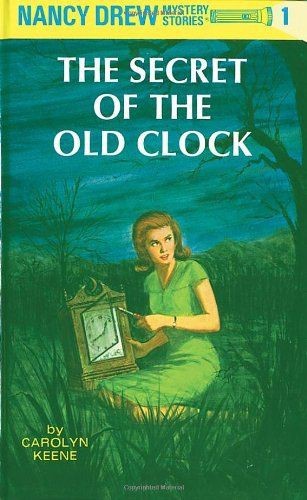

An important note is that one of these books, A Royal Pain, talks about someone thinking they've been switched at birth with someone else, and this switched at birth idea gets also associated with Nancy in season 3 when she talks to her mom...

Then we have obviously the "Nancy" book with the clock being related to Vecna's clock and there's a mystery connected to this clock and then Peter Pan which Henry is sort of a dark version of that when he takes children away to a land where they stop growing........... 💀
people have already talked about this and also about Petergate (the name Peter gets repeated in the show SO many times) and the belief that there might be someone important to the story called Peter that we don't know about yet, or maybe that has been mentioned only once in season 4 aka Owens son that seems to be both dead and somehow, the military thinks he may be related to how Chrissy died so maybe he died in the same way as her?
Because they take his things and put this line in the show for some reason
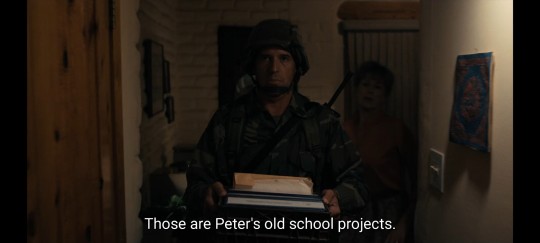
#petergate#holly wheeler#st5 spoilers#st5 speculation#st details#stranger things#henry creel#nancy wheeler
53 notes
·
View notes
Note
Hey, same anon here who asked if he’s being hurt in prison. They’re definitely dehumanising him big time and it’s clearly backfiring on them. The excessive show of force is so disgusting. There’s no doubt they’re trying to intimidate him.
I’m worried about them physically hurting him inside. While they parade him around in chains, outside of the first outburst they don’t seem to be manhandling him. If he has injuries from his time inside, would his lawyer be able to do something about it? I swear his guards look like they want to kill him.
I’m Indian and the system here is similarly corrupt. However, a high profile prisoner does have recourse here if he/she is able to prove they’re being physically abused in prison. Is it the same in the US?
Thanks for answering!
in the u.s., prisoners are protected by the eighth amendment, which prohibits cruel and unusual punishment, including physical abuse by prison staff.
inmates can both
pursue legal action (under 42 u.s.c. § 1983: individuals to sue government officials for civil rights violations, including abuse in prison.)
+ file complaints through internal prison grievance systems or with the department of justice. however, human rights watch has highlighted how these laws are often used to dismiss cases on technicalities, including lawsuits involving sexual assault, juveniles, or those who are illiterate, deaf, or mentally ill. as david fathi from the american civil liberties union’s national prison project puts it, “this is a classic case of the fox guarding the henhouse.”
in general, proving abuse and gaining legal support is hard, i imagine this is even more so in a prison environment.
considering that luigi is considered a high profile prisoner, he may have a better chance of receiving attention and legal resources if anything happens to him. the prison has been under a bunch of scrutiny for being poorly operated before, so i guess there is a public interest and incentive there. recently the prison was involved in $10 million class-action lawsuit over “inhumane freezing conditions” during a blackout
on the bright side, the pennsylvania prisoners took an immediate liking to him, stating that they only participated in the news interview “so luigi could hear them”. according to the same article, he shares his proceeds with people around him. community building seems to come naturally to him which undoubtedly will work in his favor.
12 notes
·
View notes
Text
Andrew Perez and Asawin Suebsaeng at Rolling Stone:
As Donald Trump recovers from an assassination attempt and Republicans head to Milwaukee for his coronation this week, the GOP elite has rallied around a new messaging strategy: emotionally blackmailing Democratic politicians, journalists, Hollywood celebs, and numerous other Trump critics into shutting up about the former president’s openly authoritarian vows and his extreme policy agenda. Since the deadly shooting at a Pennsylvania rally Saturday, prominent conservatives have been working to blame the incident on Trump’s enemies for labeling him a “fascist” and for fanning heated “rhetoric” that, in their telling, caused the would-be assassin to shoot at the former and perhaps future American president. “When the message goes out constantly that the election of Donald Trump would be a threat to democracy and that the Republic would end, it heats up the environment,” House Speaker Mike Johnson (R-La.) said Sunday, adding: “It’s simply not true. Everyone needs to turn the rhetoric down.”
Two of the finalists on Trump’s vice presidential shortlist quickly blamed the assassination attempt on talk about his authoritarian plans. “The central premise of the Biden campaign is that President Donald Trump is an authoritarian fascist who must be stopped at all costs,” Sen. J.D. Vance (R-Ohio) wrote Saturday night. “That rhetoric led directly to President Trump’s attempted assassination.” Sen. Tim Scott (R-S.C.) said the attack on Trump was “aided and abetted by the radical Left and corporate media incessantly calling Trump a threat to democracy, fascists, or worse.”
Top Trump ally Sen. Lindsey Graham (R-S.C.) said Sunday he had been “worried about this for a very, very long time,” adding: “You know, if he wins, democracy is not going to end. He’s not a fascist. He represents a point of view that millions share. The rhetoric is way too hot.” These messages are all part of a deliberate strategy. Within the first three hours following the failed assassination of the presumptive 2024 GOP presidential nominee, three sources close to Trump were already feverishly detailing to Rolling Stone how Republicans could use the shooting to their political advantage — whether for potentially mammoth fundraising, propaganda about Trump being “tough” and a “fighter,” or attacks on Democrats as belonging to the actually violent party every time they bring up things like the deadly Jan. 6 Capitol riot that Trump instigated.
[...]
The attempt on Trump’s life does nothing to change the reality that he is — in fact — running on an openly authoritarian platform. Trump and his closest allies are pledging to punish President Joe Biden and other top Democrats and jail his political opponents; unleash the National Guard and active-duty troops on Democratic-controlled cities whenever he wishes; end the Justice Department’s independence so he can use it to crush his foes, shut down his criminal cases, and erase any hope of accountability for his alleged crimes; retaliate against media outlets that cover him negatively; deport pro-Palestine protesters; oversee an unprecedented crackdown on immigrants, potentially erecting a vast network of camps on U.S. soil; further institutionalize his anti-democratic lies and conspiracy theories that led directly to the Jan. 6 attack; and even invade and bomb Mexico if he feels like it. Trump has quite literally pledged to be a dictator on “day one.” He later reiterated that he intends “to be a dictator for one day” — arguing such power would be necessary to erect a border wall and “drill, drill, drill.” On the campaign trail, the former president has evoked the rhetoric of Adolf Hitler, accusing immigrants of “poisoning the blood of our country.”
Trump allies are seeking to make Democrats and the non-right-wing media say “Uncle” to force them to stop talking about Trump’s record of dictatorial conduct, fascism, and divisiveness in the wake of the assassination attempt Saturday against him.
I say hell no to surrendering to their dreams of silencing us and instead continue to warn about the real danger to our democratic systems Trump and his acolytes are.
See Also:
Public Notice: Multiple things are true about Trump's shooting
The Present Age: Rewriting the Rules of Engagement: GOP's Attempt to Silence Legitimate Criticism
Vox: This is how you get escalation
The Signorile Report: Do not allow Republicans to silence criticism of Trump
The Status Kuo: GOP Gaslighting and Trump’s Cycle of Abuse
#2024 Trump Assassination Attempt#Donald Trump#Media Bias#Censorship#2024 RNC#2024 Presidential Election#2024 Elections#Mike Johnson#J.D. Vance#Tim Scott#Lindsey Graham#Propaganda
20 notes
·
View notes
Text
Vice President Candidate Tim Walz - Some of his Issues Before The Voters
• The Floyd riots. Walz managed to infuriate mainstream voters when he initially refused to quell the riots and arson that followed George Floyd’s death in Minneapolis, only to enrage activists later when he called in the National Guard. Violent crime continues to plague the state.
Walz also signed a 2023 bill giving felons the right to vote except while they are incarcerated.
• Covid: Minnesota was a proud lockdown state; Walz enforced closures, restrictions and curfews, as well as a mask mandate, for more than a year. Police arrested a business owner who defied restrictions, while Walz set up a hotline that allowed residents to tattle on others who weren’t following his rules (Walz said the snitching was for people’s “own good.”)
• Spendalooza: Minnesota is racing to become the California of the Midwest, via a spending blowout that has ballooned government and depleted coffers. Walz hiked taxes, blew through a $18 billion surplus, and is on track for a $2.3 billion deficit. The money was thrown at a bevy of progressive priorities, including public education, “free college,” paid family and medical leave, and expanded government health care.
• Green New Deal: Walz tied his state’s vehicle emission standards to California regulations, among the strictest in the nation. And he signed a bill requiring state electric utilities to be 100% carbon free by 2040—an insane, and costly, fantasy.
• Culturally weird: Walz gave his party a laugh when he declared Republicans “weird,” though it’s Minnesota that’s rapidly moved away from cultural norms under his tenure. He signed a law making the state a “sanctuary” for minors seeking transgender hormone treatment and surgery; another one mandating the dispensing of tampons in school boys’ bathrooms; and a law that declares an “individual” right to an abortion with no time limit or requirement that minors notify their parents.
Dept. of Conventional Wisdom: Walz has a jovial Midwestern style, and is often found chatting about his love of hunting or coaching while sporting a Carhartt jacket and baseball cap. Democrats intend to present him as their bridge to working-class voters and argue he’s capable of presenting progressive policy as practical and positive for most Americans. Think Pennsylvania Sen. John Fetterman or Montana Sen. Jon Tester. Yet Minnesota has little to show for its massive spending and liberal governance: Crime is up; education proficiency rates are down; capital and residents are leaving; inflation remains high; and job numbers are ticking down. Minnesota’s tax rates—individual, corporate and estate—are now among highest in the nation. Walz didn’t fare well with working-class voters in his gubernatorial elections. And his policy history magnifies the perception of a far-left ticket.
The real error may be lost opportunity. Vice-presidential candidates don’t usually make-or-break a ticket, but with another potential razor-thin presidential race in November—one that may very well run straight through Pennsylvania—Harris’s decision to walk away from a popular Keystone governor was risky.
40 notes
·
View notes